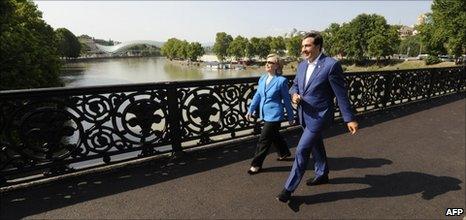Clinton's balancing act with Russia's neighbours
- Published

It was a brief visit by the US secretary of state
There were many purposes to Hillary Clinton's whirlwind tour of Ukraine, Poland and the Caucasus, but two of them seem especially important.
On the one hand the trip was intended to defy critics who say the Obama administration is not doing enough to tackle democracy issues in countries once under Moscow's sphere of influence whilst, on the other, reassuring the governments of those countries that they have American support.
Her trip comes as Washington renews and increases its engagement with Moscow - a policy known as "reset".
Above all, the trip was portrayed as a democracy tour, promoting US interests in seeing stronger, freer societies.
Her overarching message was laid out in a speech she gave in Poland. Before an audience of senior government officials, Mrs Clinton recalled Winston Churchill's warning 65 years ago that an iron curtain was descending across Europe.
"We must be wary of the steel vice in which governments around the world are slowly crushing civil society and the human spirit," the secretary of state said.
She was referring to Zimbabwe, the Democratic Republic of Congo, Ethiopia, Cuba, Egypt, Iran, Venezuela, China and - notably - Russia.
However, her choice of words was revealing given that the next stop on her trip was Azerbaijan - a place which has been lambasted by European rights groups for jailing journalists and bloggers.
'Reset' worries
There, she preferred to take a cautious approach on the issue of democracy, choosing to look for positives rather than negatives.
She said she had raised the case of two anti-government bloggers jailed nearly a year ago but she stopped short of outright finger-pointing.
"There is still a lot of work to be done", Mrs Clinton said.
In Azerbaijan the delicate balancing act was not so much about Russia as it was about Afghanistan. She was visiting Baku to repair frayed ties in a key transit country.
Thousands of US overflights carrying troops and supplies have passed through Azerbaijan on their way to the war in Afghanistan since 2001.
In Georgia, which has sent more than 700 combat troops to Afghanistan, the secretary of state again appeared to tread carefully.
She had next to nothing but praise for President Mikhail Saakashvili's government's efforts to strengthen democracy.
"Georgia has made real progress in the past few years… improving living standards, reducing corruption and building one of the fastest reforming economies in the world," she said at her joint press conference with President Saakashvili.
It went down well with the Georgian government but one analyst says America should not ignore democracy issues.
Professor Lincoln Mitchell of Colombia University in New York says that, since Barack Obama became US president, a narrative has been created in America based on fears in countries like Georgia that the policy of "reset" will mean they get ignored.
"The… narrative then takes on a political sense, precluding the US from criticising issues like Georgia's inconsistent path to democracy," he said.
'Occupation'
While Mrs Clinton reiterated that the US did not believe in spheres of influence, she was clearly trying to strike a balance between keeping pro-Western forces in Ukraine and Georgia happy and not upsetting Moscow.
In Ukraine, Mrs Clinton told President Viktor Yanukovych that the door to potential Nato membership remained open.
In Tbilisi, Mrs Clinton went even further. She said the presence of Russian troops in Georgia's breakaway territories (South Ossetia and Abkhazia) constituted an "occupation" - a word which comes as music to the ears of the Georgian government, which has lobbied hard for its use by Western allies.
Mrs Clinton also said the US was committed to ensuring Russia abided by its agreement to withdraw troops to their pre war-positions - as they agreed to do in a cease-fire agreement signed in August 2008.
In some quarters this is seen as the US giving fledgling democracies like Georgia an easy ride.
"If the United States is really involved in these countries then it needs not to be cowed into being uncritical of the Georgian government," says Mr Mitchell.
"The US should be working on its own strategy in the territories of Abkhazia and South Ossetia, not avoiding it just because it doesn't want to rock the boat in Tbilisi," he told the BBC.
Mrs Clinton's visit was always going to be a delicate balancing act: contenting allies along Russia's border whilst not upsetting Moscow.
In the end the countries she visited got their reassurance but, in the long run, keeping everyone happy is going to be hard and the US knows it.
- Published5 July 2010
- Published2 July 2010
- Published30 June 2010